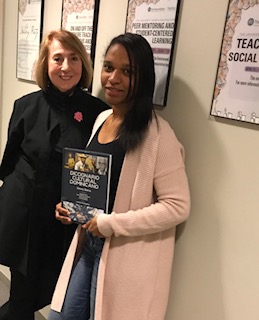Last week I had the honor to meet with President Leonel Fernández, former President of the Dominican Republic, and some of his colleagues, including Natasha Despotovic, Executive Director of the Global Foundation for Democracy and Development. President Fernández had read The New Education–indeed, it seems as if his entire staff had read it. When I brought a copy of the book for him, they all smiled: I was astonished and honored to see many copies of it in his office, some of them well thumbed. Clearly the ideas in that book spoke to President Fernández who many regard as the “education President” of the Dominican Republic.
President Leonel Antonio Fernández Reyna is a lawyer by training and was President of the Dominican Republic from 1996 to 2000 and from 2004 to 2012. Since January 2016, he has served as the President of the EU-LAC Foundation, The European Union, Latin America and the Caribbean Summit (EU-LAC Summit), a “bi-annual meeting of Heads of State and Government of the European, Latin American and Caribbean countries.” EU-LAC works to develop strategies across the European Union and Latin America and the Caribbean.
President Fernández especially wanted to speak to me about the need for modernizing higher education in the Caribbean, specifically in the Dominican Republic. The need for engineers and computer scientists is great there and he was very interested in my idea that STEM should not be divorced from a liberal education but, on the contrary, that everything one learns from the best, most relevant liberal arts makes STEM learning more relevant and equitable. One should not just tack an “ethics” course onto computer science but should be using the basic principles of ethics and equity as one learns everything from code to data mining to data visualization. These should be intrinsic, with scientists well trained to always and automatically ask: what bias does that algorithm multiply? what bias is hidden within? what expense or data requirement makes access to this tool out of the reach of those who most need it? which tools make money for their producers but do not actually serve those who use it? is this tool safe, secure, private, reliable?
These are questions where the technology is placed within the context of human, social concerns. Right now, far too much STEM training is conceived as if it is neutral. It is not. Neither knowledge nor technology are ever simply neutral.
During our time together, we talked about what it might mean to create an experimental university in the Dominican Republic that exemplified ideals in The New Education and could serve as an interdisciplinary space where college professors, graduate students, and undergraduates could come together to learn in the most exciting, experiential, service- and community-based ways, across disciplines. Because the Dominican Republic is not a wealthy country, such an experiment would be about innovation and equity. Together and intrinsically.
If we move ahead and think further about these ideas, I’ll report back on hastac.org.
In the meantime, I’ll end with a very delightful side highlight. The wonderful financial assistant in our Futures Initiative program here, Celi Lebron Cuello, is from the Dominican Republic. Celi was a computer science/engineering major at City College, where she graduated in 2017. Currently, she is taking finance and economics courses at Baruch College and hopes to pursue an MBA eventually. Celi–like many CUNY students–works full time and part time, more than 40 hours a week, and is a student taking two courses a semester. When I mentioned to Celi that I had met with President Fernández, she was immediately impressed and excited: not only was he the “education President” of her country but one of his pet projects was creating scholarships so that students from the Dominican Republic could come study in the U.S. It turns out that Celi was one of those scholarship recipients, a winner in the CUNY-MESCYT 2008 scholarship competition. She’d actually had the good fortune to met President Fernández previously, when he announced the winners of the competition.
He signed and gave me the copy of the book that Celi is holding in the photograph of the two of us–a memento, but, I hope, also a pledge of future relationships between CUNY and universities in the Dominican Republic.
